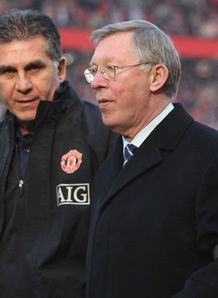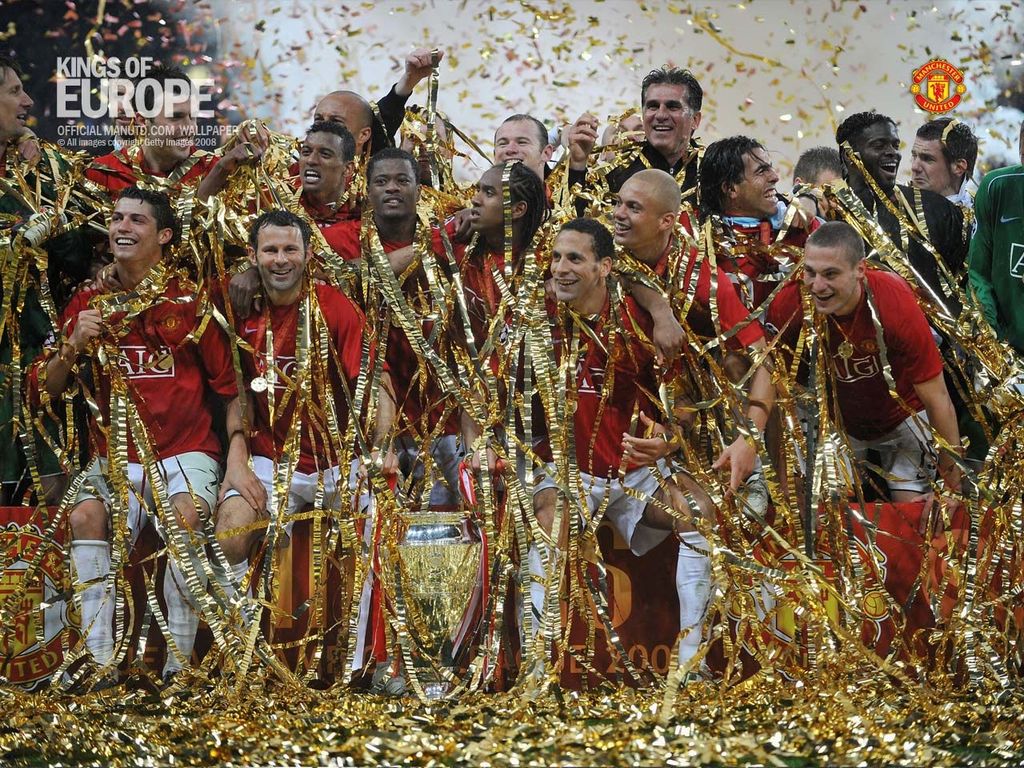 List of Manchester United F.C. managers
List of Manchester United F.C. managers
The following is a list of managers of Manchester United Football Club and their major honours from the beginning of the club's official managerial records in 1892 to the present day. As of the start of the 2007–08 season, Manchester United have had 18 full-time managers.
The most successful person to manage Manchester United, to date, is Sir Alex Ferguson, who has so far won ten Premier League titles, five FA Cups, two League Cups, eight Community Shields, two UEFA Champions League titles, one UEFA Super Cup, one UEFA Cup Winners' Cup and one Intercontinental Cup in his 21-year reign as manager. The club's longest-serving manager is Sir Matt Busby, who had two spells managing the club from 1945 to 1969 and from 1970 to 1971, totalling 24 years, 338 days.
Managerial history
From 1878 to 1914, the team was selected by a committee whose secretary had the same powers and role as a manager has today. There were four secretaries during this period, A. H. Albut, James West, J. Ernest Mangnall and John Bentley.
Ernest Mangnall was the first man to bring any major silverware to the club, winning the club's first ever Football League Championship in 1908. This was followed by the FA Cup the following season, and another league title in 1911. Despite this success, though, he left the club a year later to join local rivals Manchester City. John Bentley took over as club secretary, but was replaced two years later by Jack Robson, who became the club's first full-time manager. He remained in the post for seven years, but resigned in December 1921 after succumbing to a bout of pneumonia.[1]
Robson was followed soon after by John Chapman. However, in Chapman's first season at the club, they were relegated to the Second Division for the first time since 1906. Three years in the Second Division followed, before promotion back to the First Division. After guiding the club to 9th place in the league and the FA Cup semi-finals in 1925–26, Chapman received a telegram from the Football Association on 8 October 1926 informing him of his suspension from management for the rest of the season; no reason was given.[2] Half-back Lal Hilditch took over for the remainder of the season, before Herbert Bamlett took permanent control.
Bamlett was manager for four years, but was unable to muster any success, the club's highest position during his reign being 12th.[3] The club was relegated to the Second Division again in 1931, and Bamlett was replaced by club secretary Walter Crickmer. This was Crickmer's first of two spells as manager of the club, retaining his position as secretary all the while. It lasted only a season, though, as he failed to return the club to the First Division. In June 1932, Scott Duncan was appointed as manager, but in his second season in charge he led the club to what remains a club record lowest League position; 20th in the Second Division. The club held faith in Duncan though, and he managed to get the club back into the First Division by 1936. However, the club was relegated again the following year, and Walter Crickmer resumed control until the end of the Second World War.
Before the end of the war, the club approached Matt Busby, who had just turned down the opportunity to join the coaching staff at Liverpool, on the grounds that he wanted more responsibility over the playing side of the club than merely the selection of the team.[3] United allowed Busby the responsibilities he requested, and in his first five seasons in charge he guided the team to four second-place finishes in the league, before finally winning his first title in 1952. He soon set about replacing many of the more experienced players with a group of youths who came to be known as the "Busby Babes". This team went on to win two league titles in 1955–56 and 1956–57, as well as reaching two FA Cup finals. Unfortunately, the careers of many of the players were cut short by the Munich air disaster, which also left Busby fighting for his life.[4]
While Busby was in hospital recovering from the injuries he sustained in the air crash, his managerial duties were left to his assistant, Jimmy Murphy. After Busby recovered, he set about rebuilding his side, and within five years, in 1963, he had won the FA Cup for the first time in 15 years. This was followed up by two league titles in three years, and then the greatest prize in European club football, the European Cup. He continued as manager for one more year after this success, leaving his managerial duties to club trainer Wilf McGuinness. McGuinness struggled in his new post, however, and Busby was convinced to return for the second half of the 1970–71 season.[4] However, he retired from football permanently that summer, and was succeeded that summer by Frank O'Farrell. O'Farrell's stay was short-lived, though, as his inability to control George Best's extravagances forced the board to sack him with three years still to run on his contract.[5]
O'Farrell's replacement was to be Scotland's newly-appointed coach, Tommy Docherty. Docherty left the Scotland job after only a month in charge, and his first task at United was to keep the club in the top flight. He managed it once, but he was unable to pull it off again and the club was relegated in 1973–74. They bounced straight back up the following season, though, and in their first season back in the top flight, the team cruised to a third place finish and yet another FA Cup final. The next year, they went one better, beating Liverpool in the final to claim his first and only trophy at Old Trafford. It was soon discovered, however, that Docherty was having an affair with the wife of the club's physiotherapist, and he was immediately fired,[6] replaced by Queens Park Rangers' manager Dave Sexton.
Sexton remained in the United job for four years, but was unable to produce any silverware, and was replaced in 1981 by Ron Atkinson. Atkinson was able to rekindle the club's cup success, leading his side to two FA Cups in his five year tenure. He also oversaw a series of respectable finishes in the league, but after his disastrous start to the 1986–87 season, he was sacked.[7] His replacement, Alex Ferguson, had, in recent years, become the first manager to break the dominance of Rangers and Celtic in the Scottish league for over 15 years, winning the Scottish First Division title with Aberdeen three times in six years, as well as finishing as runner-up twice.
Since his appointment, Ferguson has been credited with the distinction of making some of the most shrewd purchases in the club's history, including the signings of Peter Schmeichel and Eric Cantona, each for less than £1.5m.[8] With these signings, combined with the club's many experienced players, Ferguson brought the league title back to Old Trafford for the first time in 26 years. In the following decade, he won the Premier League title another six times, including a hat-trick of titles from 1999 to 2001, a feat that no other manager has yet achieved with the same club.[9] In 1999, he also led the club to an unprecedented Treble of Premier League, FA Cup and UEFA Champions League. Since then, he has added another three league titles to his trophy haul, despite a number of promises of retirement.[10] Ferguson won his tenth Premier League title in the 2007–08 season, and followed this up with his second Champions League title ten days later.
Content from:
From Wikipedia, the free encyclopedia
http://en.wikipedia.org/wiki/List_of_Manchester_United_F.C._managers



0 comments:
Post a Comment